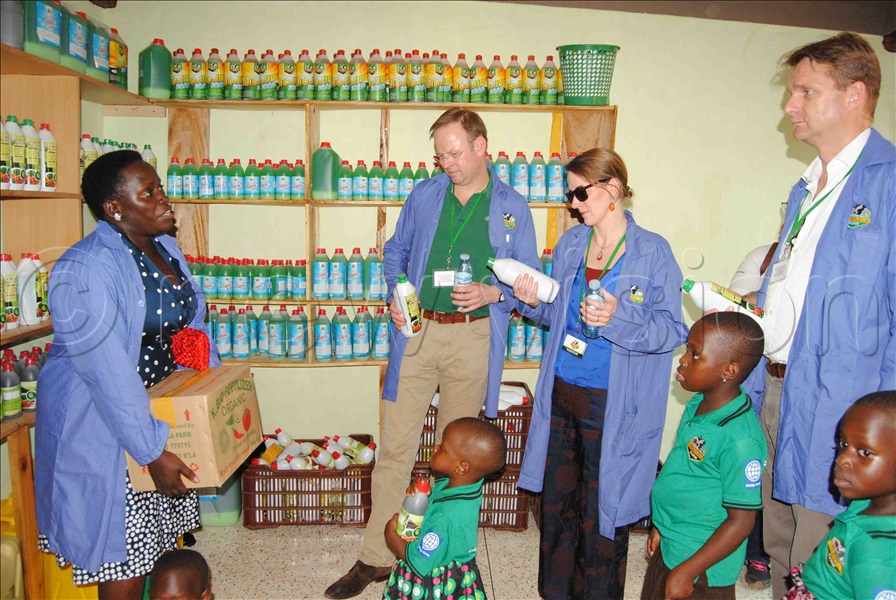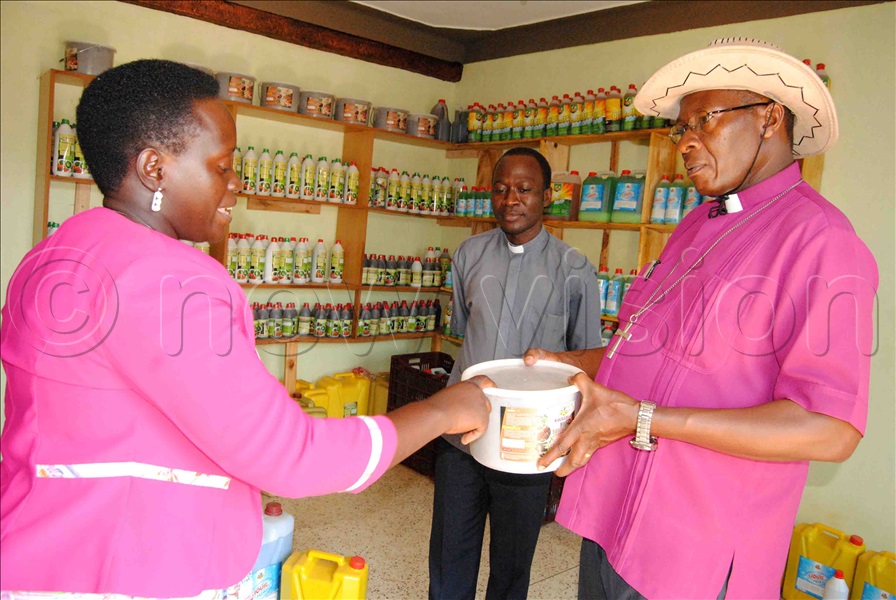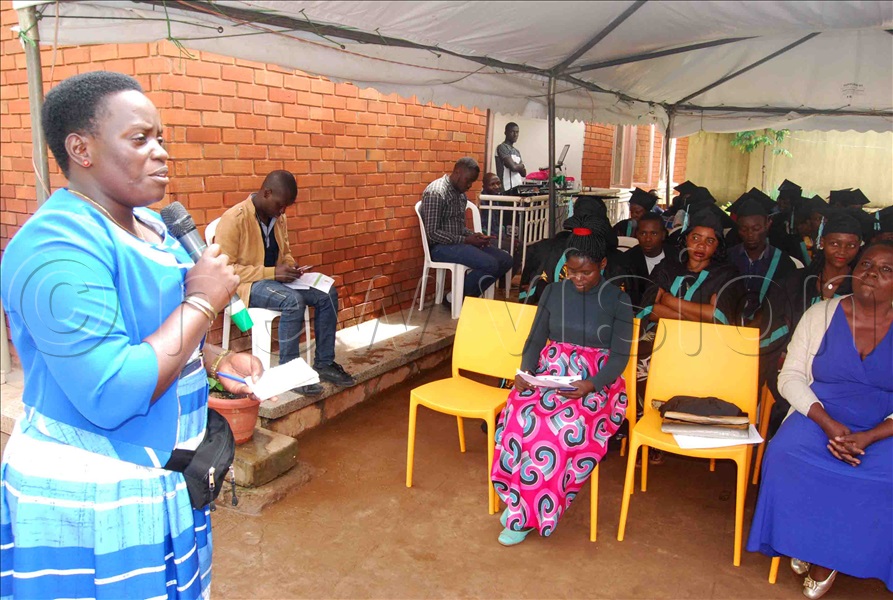“When I won the best farmers competition in 2015, I had a small farm with chicken and vegetables, plus three cows,” she says.
Today, two-storeyed structures in her compound are an indication of how far Professor Diana Nambatya Nsubuga, the proprietor of Kwagala Mixed Farm has advanced since her win.
In 2015, when she won, her homestead in Kulambiro, Nakawa division, Kampala was simply an organised urban farm with no big innovations.

She had a chicken house with 1,500 birds, a cattle shelter with three cows and mainly potted vegetables.
Seven years later, the homestead has several new structures. One of the structures is a training centre for other farmers, a double-storeyed building constructed in 2018 and the second houses a fertiliser processing unit.
The third structure located at the gate has a fresh foods market. She still grows the vegetables in pots, sack gardens and even on the roof of one of the structures.
She also still maintains five cows, both for milk and uses their dung for fertilizers.

Overall, the farm’s earnings improved as the spending vis-a-vis revenue was streamlined.
“Netherlands taught me to keep records, register my business, pay taxes and many other things,” she says.
Training farmers
“When I was declared among the 2015 best farmers, many people started coming for training and I did not have a suitable structure for that purpose. This is why I set up a building for training,” she says.
She has trained over 3,000 people over a period of five years.
In 2017, Nambatya was given a grant by AVSI/SKY to train youths and women in urban farming.
The farmers are trained in farming using small spaces, making vegetable towers, looking after poultry, growing vegetables and business management.

The training was supported by AVSI, through Skilling Youth for Employment in Agribusiness (SKY), which is a funded programme by the Embassy of the Netherlands and the National Agriculture Research Organisation, through their World Bank supported Competitive Grant for innovators.
In order to offer professional training to the farmers, Nambatya collaborates with the Kampala City Council Authority (KCCA) urban farm, Kyanja, Nakawa Division who provide additional expertise through some of their trainers.
Additionally, she has also allowed students under the annual Gayaza Farm camp to visit and learn at the farm. The farm camp brings together tens of schools with an annual attendance of about 1,000 learners.
Beyond training farmers at her home, Nambatya has since expanded Luwero and Kiboga districts.
In 2020, there was a pass-out ceremony for 50 youths and women from Buligwe in Makulubira sub-county in Luwero who had been trained in modern farming practices of the trainees.
The best individual and group from the trainees in Luwero were each rewarded with sh500,000 to boost their farms. The best trainee was Rashida Nantaba and the other winner was Buligwe Youth Group.
While preaching during the graduation ceremony, Rev. Gideon Kabuye, of Bbowa Parish commended Prof. Nambatya for the inspirational work she is doing to promote the works of God as he gave man farming as his main food and income generation activity.
“When God gives a gift, you become his light to spread his teachings wherever you go. Prof. Nambatya has been God’s light. And now that she has enlightened you, you must also be God’s light and light others. This way, Buligwe and Uganda at large are seeing the light to transform from one of the best farmers,” said Rev. Kabuye.
Dan Kisitu, the agricultural officer of Makulubira sub-county in Luwero, says the trainees are now fully engaged in commercial farming.
“According to research by the Ministry of Agriculture Animal Industry and Fisheries (MAAIF), Uganda has seven million families of which 6.9 million families are engaged in agriculture, but only 4.8 million families are engaged in commercial agriculture. This would be our job but we thank Kwagala Farm for training our people,” he said.
He said as the sub-county, they are working with the trained youths through the government programmes like Youth Livelihood Fund, and Operation Wealth Creation (OWC) since they have been having challenges with getting trained youths to work with.
“Every three months, we take our people to visit progressive farmers to improve their agronomical practices. I, therefore, advise you to register your association because many of the government funds and help are accessed through associations,” he said.
Processing fertilizers
But it is the newest structure in the compound that however shows that an innovative best farmer will always capture the eye of the market and other stakeholders.
The structure houses the new powdered fertiliser manufacturing unit. The new unit also shows how an urban farmer can use available resources to practice value addition at home.
“In the Netherlands, I realized that farmers were using the waste from livestock to process organic fertilizers,” she says.
She vowed to start doing the same.
“I have advanced this far thanks to the exposure I got from the best farmer’s competition. I would never have met the partners that have supported me if I had not taken part and won in the competition,” she says.
According to Nambatya, as her farm continued to grow, it became clear that the problem of food and nutrition insecurity was not restricted to urban centres.
“I realised after my winning exposure that the poorest of the poor live in rural Uganda, mostly engaging in subsistence agriculture with limited good agricultural skills and no access to farm inputs like fertilisers,” she says.
When she visited Luwero and Kiboga districts in her crusade to fight hunger, she discovered that farmers were grappling with depleted soils and unreliable reliable rains, these farmers are producing less, eating less and selling less.
Nambatya and her co-founders embarked on a journey to help the most vulnerable rural farmers to rejuvenate their soils, boost productivity and to market their produce.
“The solution was an organic fertiliser made from traditional African herbs and materials that are locally sourced. This wholesome fertiliser has been embraced by locals because it is easy to apply,” she says.
It is cheaper and easier to apply than artificial fertilizers. She says that this is a particularly important factor in the low-income and semi-literate settings that are often sceptical of fertilisers.
Nambatya’s journey to processing fertilisers started from the by-products of her bio-gas system. The bio-gas is fed by dung from at least five dairy cows housed at the back of the compound.
Slurry runs out of the bio-digester into a collection pit where it is sourced and used as a fertiliser.
When she won the competition, she learnt that the slurry that came out of the bio-gas unit was a good organic fertiliser. At first, she used to scoop it up in tins and buckets and applied it on her vegetables, where she realised good yields, she recalls.
Then as an improvement in 2016, she started packing the refined slurry in small jerrycans for sale to other farmers.
Between 2015-2017, she had been distilling and packing the slurry in small jerrycans and selling it. However, she realised with more research that she can process the same into powder, with added ingredients.
“However, it was challenging to turn slurry into powder,” she says.
The process involves mixing the ingredients, heating, drying and then pulping it into powder.
In 2019, with the assistance of AVSI/SKY, she was given a complete fertiliser processing unit. The unit uses generators and includes a mixer and pulper. The product is then packed in 10kg sacks for sale.
“When AVSI gave me the processing unit, I co-shared the cost by constructing this double-storeyed structure in which these machines are fixed,” she says.
The processing unit is worth over sh40m. The structure cost her over sh50m to put up.
She then took her samples to the Ministry of Agriculture Animal Industry and Fisheries (MAAIF) for certification in 2019.
“Indeed they were tested and found to be worth putting on the market and they were certified as NARC/CGS/5/3616 by NARO and MAAIF,” she says.
The product is now on the market under the Kwagala Organic Fertiliser brand.
“I started processing powdered fertilisers because they are more acceptable to the market and easier to use,” she says.
She pointed out that a farmer uses about one kilo, spread at the base of the crop each season. An acre with 450 plants needs at least 450kgs.
Biggest achievements
Nambatya says that her biggest achievement so far has been giving out farming knowledge to women and youth.
“Skilling and training over 3,000 women and youth in urban farming with an agri-business focus are one of our biggest achievements,” she says.
She adds that there is no wonderful satisfaction as that derived from helping others,” Nambatya further explains that the many partnerships that she has, for example with the SKY project, the annual Gayaza camp, the National Agriculture Research Organisation (NARO) are also remarkable achievements.
Fresh foods market
In her neighbourhood in Kulambiro, there are so many smallholder farmers growing mainly vegetables like tomatoes and cabbages in small spaces. But then, they did not have a place to sell their product.
To partially solve this challenge, the farm now runs a farmers’ market on the premises that sells freshly sourced farmer products.
“The farmers bring their fresh produce here and we sell it,” she says.
To further widen market access, she has memoranda of understanding with several supermarkets to supply them with fresh produce.
“We select some of these vegetables, pack them and supply them to several supermarkets around the city,” she says.
These include the Carrefour stores. This way, the farmers are assured of a market.
Family involvement
Dr. Fred Nsubuga the Co-director of Kwagala farm and Nambatya’s husband says that if one believes in themselves and uses the knowledge they have acquired to transform their lives and the communities they live in, everybody benefits.
“At Kwagala farm, our main objective is to show people that it is possible in whichever situation you are in. You can be the best farmer with the smallest piece of land if you don’t wait to get acres of land. What you have is the talent God gave you, all you need is to have self-evaluation and have a direction for your life,” he said.
In addition to the training, the family also started Kwagala Foundation through which they support vulnerable people.
“We have a portion of our profit that we donate to the needy,” Nsubuga says.
One of the beneficiaries of this is Resty Nakayenga, a disabled lady from Luwero who got a wheelchair through the foundation.
“I was struggling to move around so when these people saw me, they offered me the wheelchair,” Nakayenga says.





